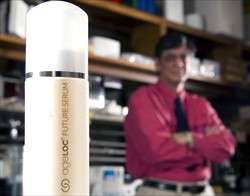BYU research yields compound that appears to slow aging effects in skin

(PhysOrg.com) -- BYU research has identified equol as a naturally occurring compound that improves skin health, and the university has licensed the technology to Provo-based Nu Skin Enterprises, the $1.3 billion global anti-aging personal care and nutritional products company.
The anti-aging skin product that features the BYU ingredient was launched in October as part of the company’s ageLOC(TM) skin care line. Nu Skin sold $28 million of ageLOC skin care products in the last quarter of 2009.
The little-known molecule, called equol, is derived from plants such as soybeans. Its benefits for skin grew out of earlier work by BYU Professor Edwin Lephart who was testing various compounds from plants for possible impacts on human health. Equol stood out.
“When we discovered how equol acts and what its properties are, of all the sites in the body where it could be active, skin just jumped out to me,” said Lephart, who was a faculty member at the University of Texas Southwestern Medical Center before coming to BYU in the 1990s.
He and colleagues published three research papers on equol’s wide-ranging potential to impact prostate health, skin, baldness, weight gain, and brain health.
Lephart prepared further experiments to test its influence on two important components of skin: collagen, which gives skin its structure, and elastin, which gives skin the flexibility to resume its shape after stretching or contracting. The work relied on a technique that cultures dermal cells in the lab to resemble human skin, and some tests lasted as long as eight weeks.
“We asked, ‘What would equol do if we added it to the human cells that make collagen and elastin - would it stimulate them?’” Lephart said. “And it does.”
Just as importantly, the research showed equol also inhibits other enzymes that break down elastin and collagen.
“So we get an increase in collagen and elastin, and we take away the enzymes that break them down, which is really cool,” said Lephart, of BYU’s Department of Physiology and Developmental Biology.
This skin-specific work was presented at two annual meetings of the American Academy of Dermatology, a premier scientific meeting of world-renowned leaders in the field.
The university licensed to Nu Skin rights to sell equol in a cosmetic skin care product.
Nu Skin’s product that includes equol is called ageLOC Future Serum, and is the stand-out product in the ageLOC Transformation daily skin care line.
BYU’s equol-related technologies are patent-pending. Lephart was the principal investigator on the studies that led to these patent applications, and he collaborated with researchers at Colorado State University and Cincinnati Children’s Hospital Medical Center. Those institutions receive a share of the royalties generated by the BYU license.
BYU negotiators are also working to license the rights to use equol to treat conditions other than skin health to other companies.
















